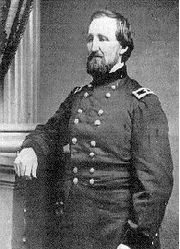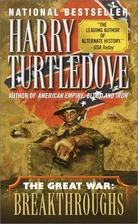| William Rosecrans | |

| |
| Historical Figure | |
| Nationality: | United States |
| Year of Birth: | 1819 |
| Year of Death: | 1898 |
| Cause of Death: | Natural Causes |
| Religion: | Catholicism |
| Occupation: | Soldier, Politician |
| Fictional Appearances: | |
| Southern Victory POD: September 10, 1862 | |
| Appearance(s): | How Few Remain |
| Type of Appearance: | Direct |
William Starke Rosecrans (September 6, 1819 – March 11, 1898) was an inventor, coal-oil company executive, diplomat, politician, and United States Army officer. He gained fame for his role as a Union general during the American Civil War. He was the victor at prominent Western Theater battles such as Second Corinth, Stones River, and the Tullahoma Campaign, but his military career was effectively ended following his disastrous defeat at the Battle of Chickamauga in 1863.
After the war, Rosecrans served as ambassador to Mexico (1868-1869) and Congressman from California (1881-1885). In between these political stints, he was a private businessman.
William Rosecrans in Southern Victory
William Rosecrans was a general in the United States Army in the 19th century. In the War of Secession, he quickly rose through the ranks, getting promoted to Brigadier General and served under George McClellan in West Virginia. During the campaign his decisions allowed the Union army to defeat Robert E. Lee's forces and secure control of the state, though McClellan stole the credit and became commander of the Army of the Potomac--with disastrous results. After the war ended, Rosecrans' position in the army rose due to coming out of the debacle with less disgrace than more prominent generals.
By 1881 Rosecrans, now a Major General served as General-in-Chief of the Army. Though popular and competent as a field commander, Rosecrans' leadership in this position was uninspired. The US Army was a paper tiger after years of neglect and Rosecrans had done little to improve this. When the crises of Sonora and Chihuahua erupted into the Second Mexican War, Rosecrans was wiling and eager to fight, confident that the war wouldn't last long due to his belief in the overall superiority of the United States over the Confederacy. However, his grand over-arching strategy lacked serious thought. Rosecrans knew that the CSA's main problem was manpower and his goal was to attack along the entire frontier, until the enormous reservoir of men simply overwhelmed the Confederacy. Another major flaw in his strategy was failing to create any plans for dealing with England and France, a mistake that would prove disastrous for the USA.
As the war began, Rosecrans failed to coordinate strategy among the various field armies and other elements of the army under his command. This resulted in many of his troops crossing the CS border and simply stopping as they lacked detailed direction and strategic goals. Rosecrans conduct failed to win him the respect of his troops and field commanders as he chose to fight the war from his office in Philadelphia rather than the front. He also did not work well with U.S. President Blaine, as Blaine constantly hounded him for results, pressuring him to move faster. In spite of their tenuous relationship, he remained cool and diplomatic towards his Commander-in-Chief.
As the war soured for the United States, Rosecrans could only watch helplessly as the great majority of his field commanders were bested at every turn by their Confederate counter-parts. After England began ratcheting up the pressure by invading the US and blockading the country by sea, Rosecrans became increasingly reclusive, and even started drinking heavily. Finally, with the US besieged from five different sides, Rosecrans finally lost his cool with the President, telling him that the war was beyond his control and lost.
During March of 1882, as the Confederacy shipped men to the Potomac to threaten Washington DC, Rosecrans also shipped as many troops to the capital as possible to counter any attack. However, by that stage, Rosecrans had lost all faith in himself as a general, having been so unnerved by his CS counterpart, Thomas Jackson. In mid April, Rosecrans, along with US ambassador to the Confederate States, John Hay, traveled to Richmond in order to deliver Blaine's peace proposal. There, he met with both General Jackson and Confederate minister to the United States, Judah Benjamin. Jackson and Benjamin sprang a sudden ultimatum upon Rosecrans and Hay. For his part, Rosecrans reacted to the Confederate's harsh demands with weary resignation and subdued indignation, as he also cursed Blaine.
Nonetheless, with the war over, Wilcox recognized shortcomings in the structural nature of his position, and in himself. On the advice of German attaché Alfred von Schlieffen, Rosecrans pushed for the reorganization of the US Army's overall command structure, adopting the Prussian-style general staff system. Sadly, in the war's aftermath, Rosecrans would be remembered only for his failings in the Second Mexican War, rather than the reforms he implemented, reforms that would later lead to the USA's victory in the Great War.
| Military offices (OTL) | ||
|---|---|---|
| Preceded by John Pope |
Commander of the Army of the Mississippi June 26, 1862 - October 24, 1862 |
Succeeded by John Alexander McClernand |
| Preceded by None |
Commander of the Army of the Cumberland October 24, 1862 - October 19, 1863 |
Succeeded by George Thomas |
| Political offices (OTL) | ||
| Preceded by Horace Davis |
Member of the U.S. House of Representatives from California's 1st congressional district 1881-1885 |
Succeeded by Barclay Henley |
| Preceded by Marcus Otterbourg |
United States Envoy to Mexico 1868–1869 |
Succeeded by John W. Foster |
| Military offices (Southern Victory) | ||
| Preceded by Unknown, last known is Henry Halleck |
General-in-Chief of the United States Army 18??-1882 |
Succeeded by Office abolished, replaced by Chief of the General Staff |










